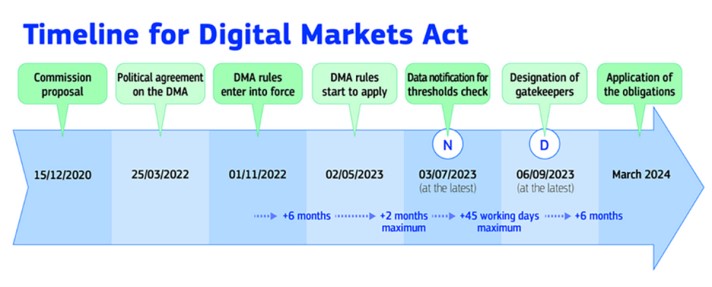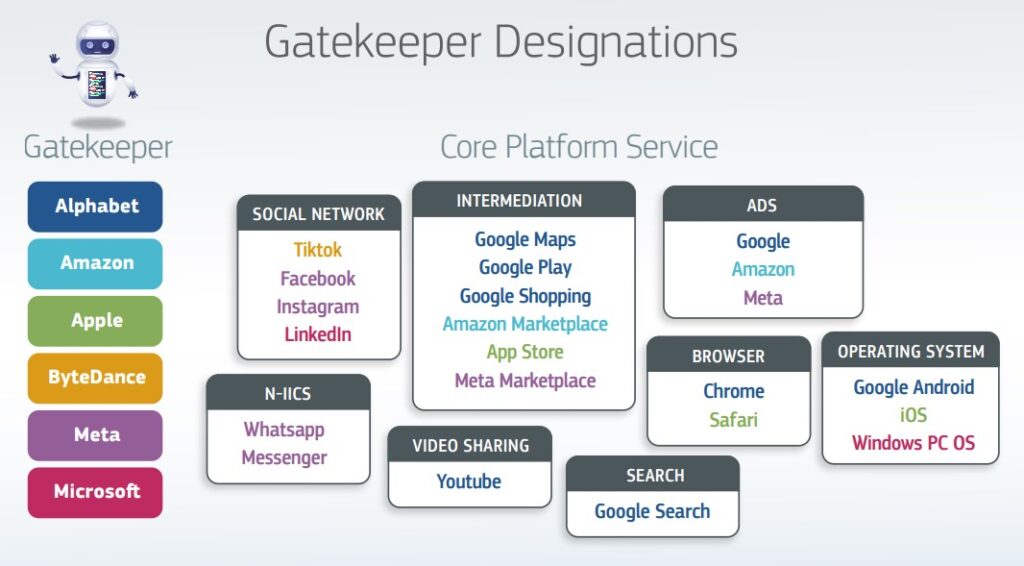The Digital Markets Act – What you need to do to prepare for it

There’s been a lot going on in the AI and data platforms world in the last couple of months.
The AI Safety Summit at Bletchley Park. POTUS’ announcement of AI Safety guidelines in the US. The potential watering-down of the EU’s AI Act. Apple launched the iPhone 15. Open AI changed its terms and conditions. Google is in court fighting an antitrust lawsuit in the States. Samsung admitted an historic data breach. And then Open AI’s boardroom implosion, together with questions about Microsoft’s role or otherwise in it.
So, it’s possible, and not unreasonable, that the latest update on the Digital Markets Act may have passed you by.
The Digital Markets Act?
“Hang on!”, I hear you say, “which Digital Markets Act do you mean?” An excellent question, because there are two very similar sounding pieces of legislation in different places.
There is the Digital Markets Bill – the DMB – (whose full title is the Digital Markets, Competition and Consumers Bill). This is currently going through the UK Parliament, which gives extra powers to the Competitions and Markets Authority (the CMA) to promote competition in digital markets, by having greater scope to intervene with Big Tech (Google/Alphabet, Meta, Microsoft, Apple). This was included as part of the King’s Speech at the opening of Parliament in November, so is due to become law in this year.
But it’s not that one I’m concerned about today. The EU’s Digital Markets Act (the DMA) is already technically in force, and again provides greater scope to ensure the Big Tech data platforms comply with regulations across the EU. This simplifies legislation across member states, and provides a set of “dos and don’ts” for the data platforms.
So, what’s happened on the Digital Markets Act so far?
Despite the fact that the DMA rules came into force across the EU this time last year, the process to define whether a business is “big tech” enough to be subject to the regulation is a lengthy process. In September, then, the first 6 businesses were designated as data “gatekeepers”, and so are subject to the DMA.
So, there’s now 6 months for those businesses to comply with their obligations. Which means that businesses have to be compliant by March 2024. Otherwise, they will face penalties of up to 10% of global turnover. Which means there is a significant incentive to get this sorted.

Source: About DMA (europa.eu)
Who are the DMA gatekeepers and what are their data platforms?
It’s a surprisingly good question.
The 6 companies are Alphabet, Amazon, Apple, ByteDance (owners of TikTok), Meta and Microsoft. Perhaps no surprises there. Samsung does appear to be lucky to not be included in the Browser list. The default browser on its phones, Samsung Internet, is not included as a Browser, whilst Safari, Apple’s default browser, is. Samsung has a 30% market share of mobile phones in Europe, just behind Apple on 35%. What arguments they made (and by Gmail and Outlook) to be excluded as gatekeepers are not provided. But Big Tech’s desire to remain as unregulated as possible appears to be in rude health.
However, perhaps more surprising is which platforms do or don’t fit into those categories. As the EU’s helpful diagram shows, there are several categories of platforms, but some you might expect to see in those categories aren’t.
Most notably, whilst there is only one video sharing platform – Youtube – (fair enough), there’s also only one Search platform – Google. Bing, despite a huge push this year, especially in light of how it integrates with Microsoft Co-Pilot and so Open AI’s Generative AI platform, is not included. Neither is Microsoft Advertising, despite positioning itself to advertisers as an integration platform with Bing, LinkedIn, Outlook and Windows.
The investigation into 4 platforms (Bing, Edge, Microsoft Advertising and Apple’s iMessage) will be completed by February, and they will then be designated or not. At this point, no Generative AI platforms are designated, although to be fair it may be too soon to have worked out the market share and forces around those, as Microsoft, Alphabet and others battle for pre-eminence.

Source: Digital Markets Act: Commission designates six gatekeepers (europa.eu)
So, this is great background, but as this only affects 6 companies, why do I need to know?
Another great question – you’re on fire today! Well, this only doesn’t affect you if your business doesn’t use any of these services in the EU, or have any EU customers who might use those services.
If you do use any of these services, then it’s likely you will be asked to do something.
Because, despite the fact the DMA is designed to restrict Big Tech, this commonly means that they will “ask” you to change your settings, so that you are compliant, rather than them doing that job for you. And if you don’t, you are likely to find that your ability to use that service will be threatened.
So, for instance, Google is starting to ask its customers to ensure Google Consent Mode is implemented correctly. If not, your ability to run advertising on Google Ad networks could be withdrawn. The same may well apply for other settings for the other gatekeepers. Watch this space!
And this will need to be done by early March 2024, so this doesn’t give advertisers, data collectors and marketplace sellers much time to make any amends they may be required to make.
Make sure you have relevant teams ready to update and validate these changes early in the New Year for any EU properties you may have.
If you want to discuss any points on this, please get in touch.


